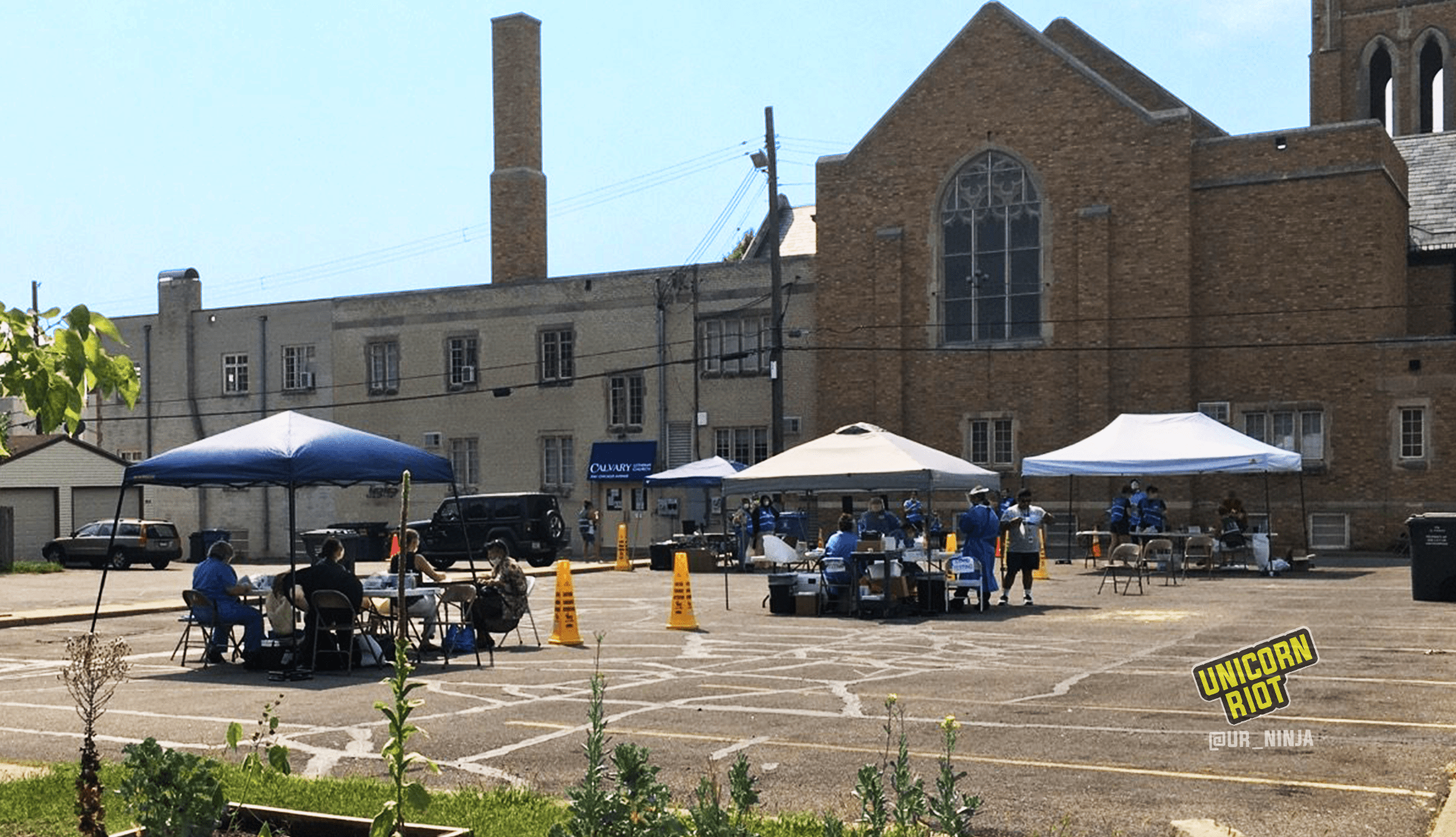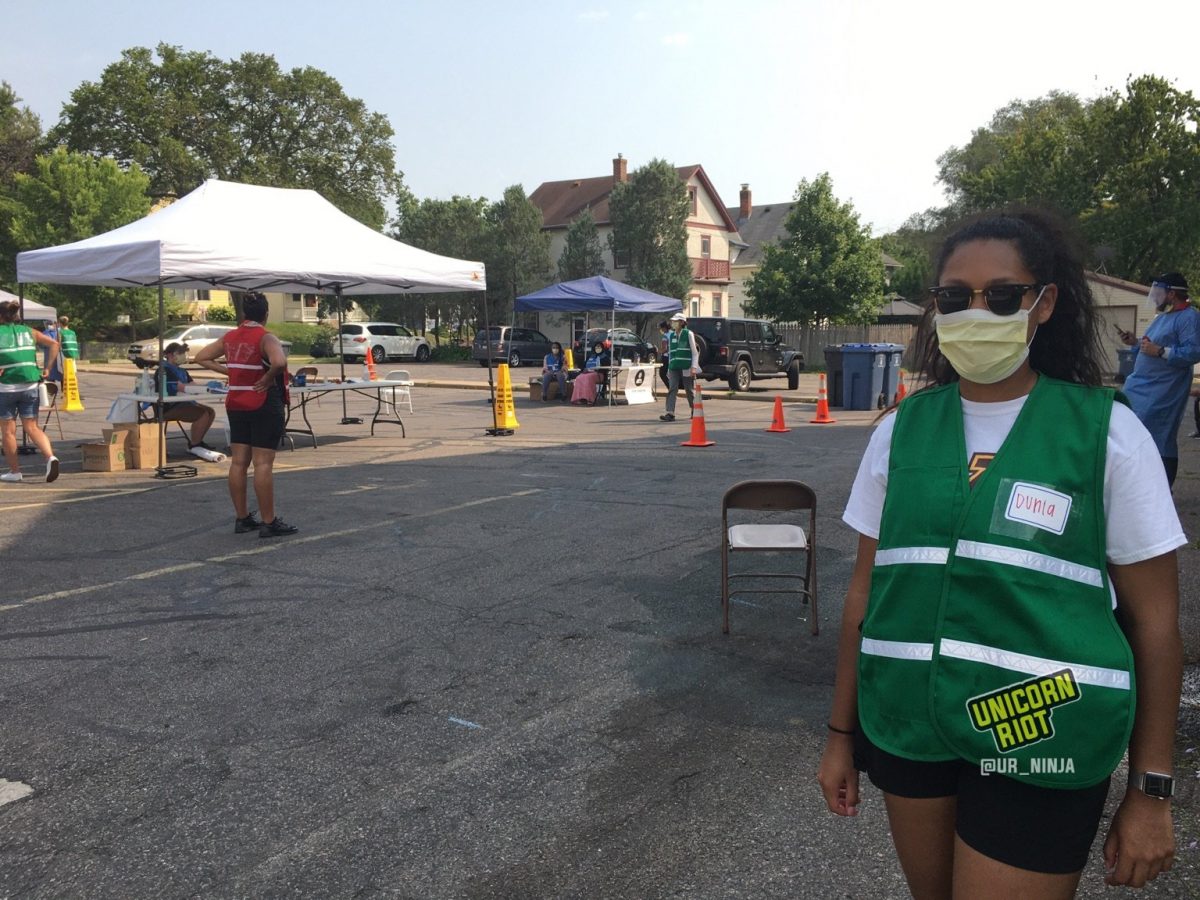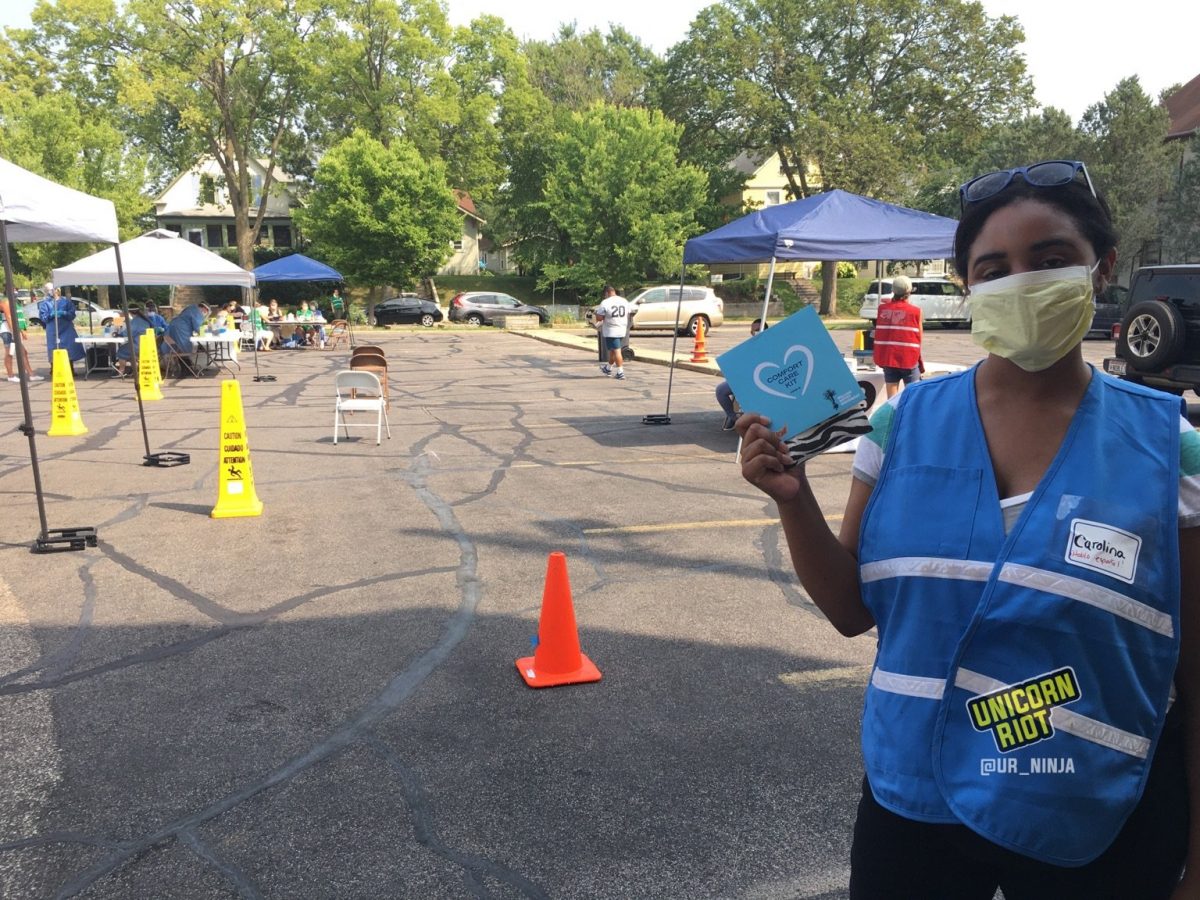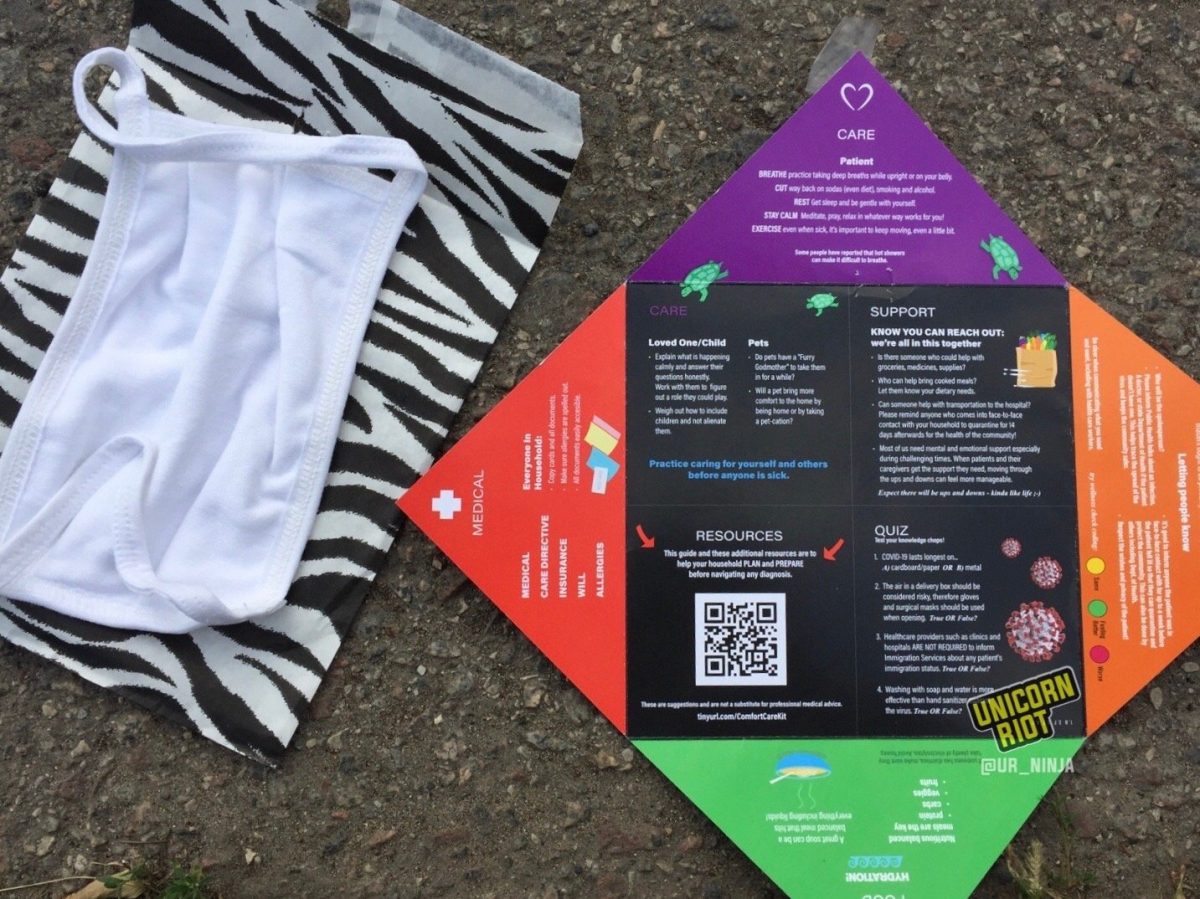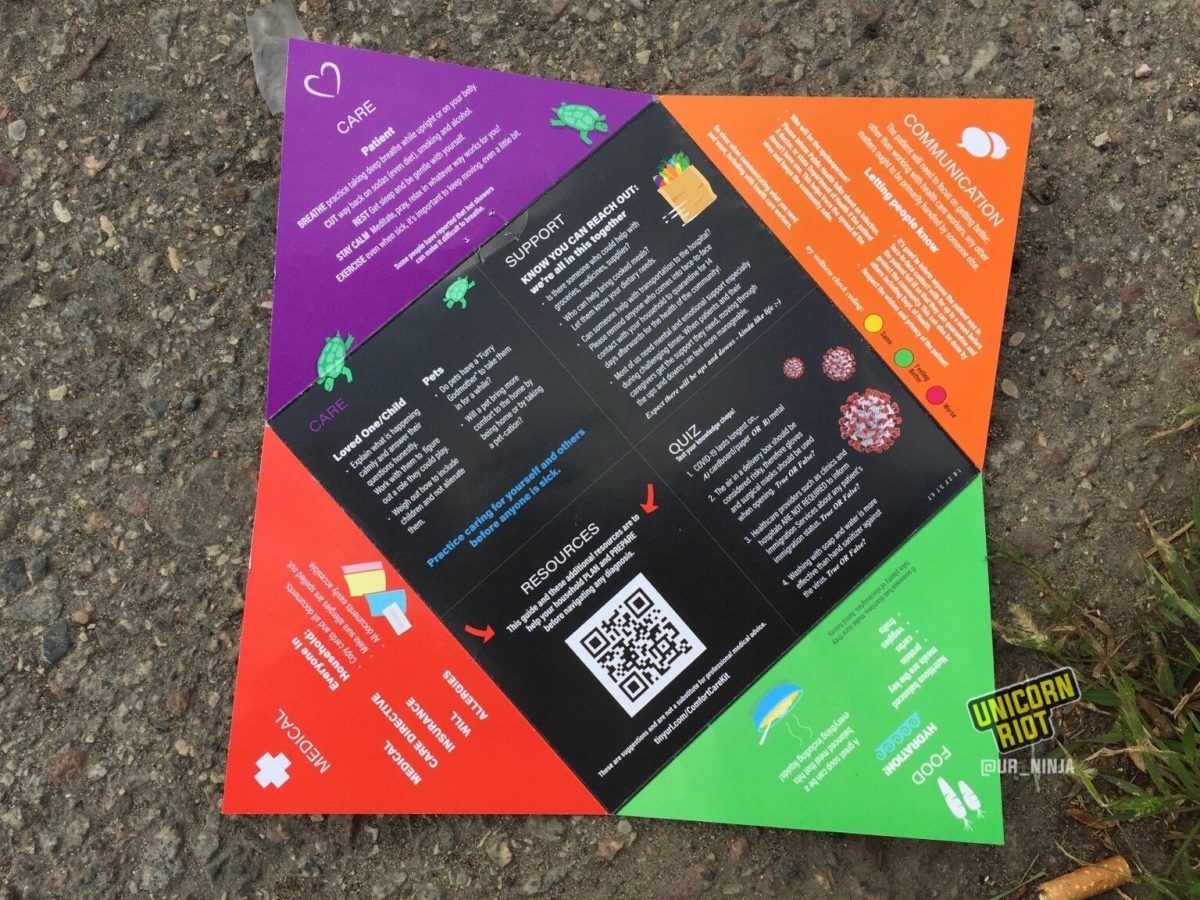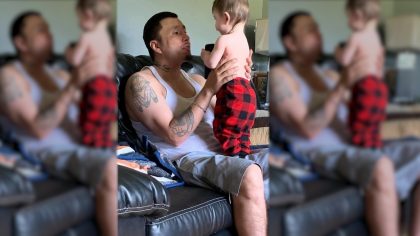COVID–19 Testing DeMystified at Community-Informed Coronavirus Testing Site
Minneapolis, MN – For two afternoons, coronavirus testing was conducted in full view of the public, free to anyone, one block south of George Floyd Memorial Square. An open-air testing center had been assembled out of folding chairs, canopies, and clipboards in the parking lot of Calvary Lutheran Church, made possible by the cooperation of several local organizations along with the city of Minneapolis.
Event organizers had advertised that Spanish, Somali, and ASL (American Sign Language) interpretation would be available, including Certified Deaf Interpreters (CDIs), so that a broader segment of the community could access educational information about COVID–19 and about the virus that causes it.
They were also careful to emphasize that everyone was welcome to come for testing—with no exceptions. “It’s free and you don’t need insurance. Just walk up!” Family Tree Clinic responded when asked whether uninsured people could get tested.
The only information required was a person’s first and surname, their date of birth, and a phone number where the results of the test—whether negative or positive—could be communicated. If a person with no phone number came in seeking testing, they could return to the site on Friday, August 28, to receive their results in person.
#Minneapolis: today, Aug 25, free #coronavirus walk-up testing took place btwn 2–6 pm at Calvary Lutheran Church.
— Unicorn Riot (@UR_Ninja) August 26, 2020
Free #COVID19 tests will be administered again tomorrow, Aug 26, from 2–6 pm.
No health insurance is needed. Organizers have said ASL interpreters are available. pic.twitter.com/VJ2N3TxeKt
Unicorn Riot visited the pop-up testing site on Tuesday, August 25. A couple people were in the process of getting tested, but the site was mostly empty of patients. One organizer told Unicorn Riot that there had been a short line when the testing site opened at 2:00 p.m., but that testing had been so rapid that there was now no line.
“Homeless encampment testing: Phelps, Minneapolis” was the name of the collection facility pre-printed on the Minnesota Department of Health’s COVID–19 “Specimen Submission and Test Request Form”. Phelps Park is the site of one of the many sanctuary encampments currently scattered across the city.
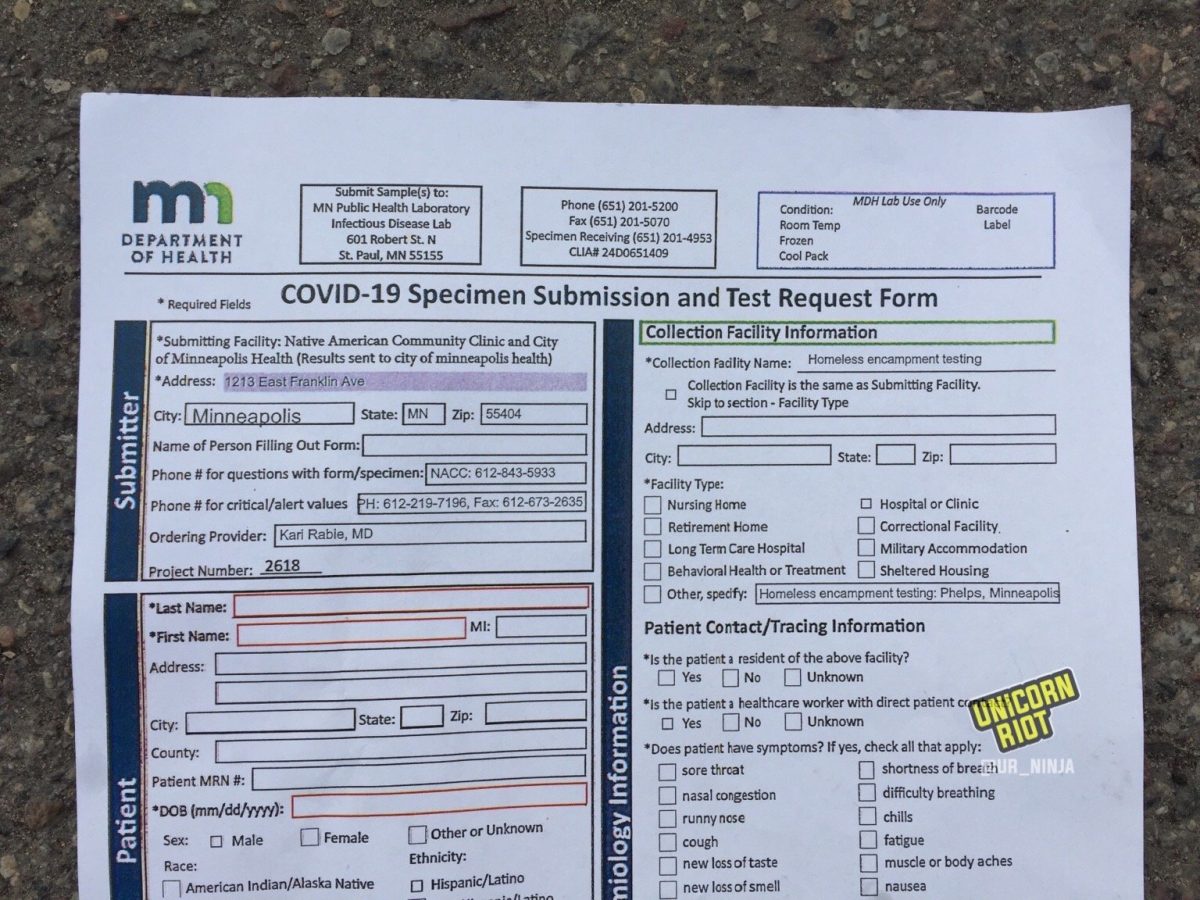
Anyone seeking coronavirus testing first filled out the above form, then waited in a physically-distanced line to be tested. Masks were required to be worn at all times, with exception of during the test procedure.
“What to do if you’re waiting for COVID–19 test results,” a three-page document from the Minnesota Department of Health (MDH) contained recommendations for both symptomatic and asymptomatic people, as well as what to do next if one’s test results come back either positive or negative.
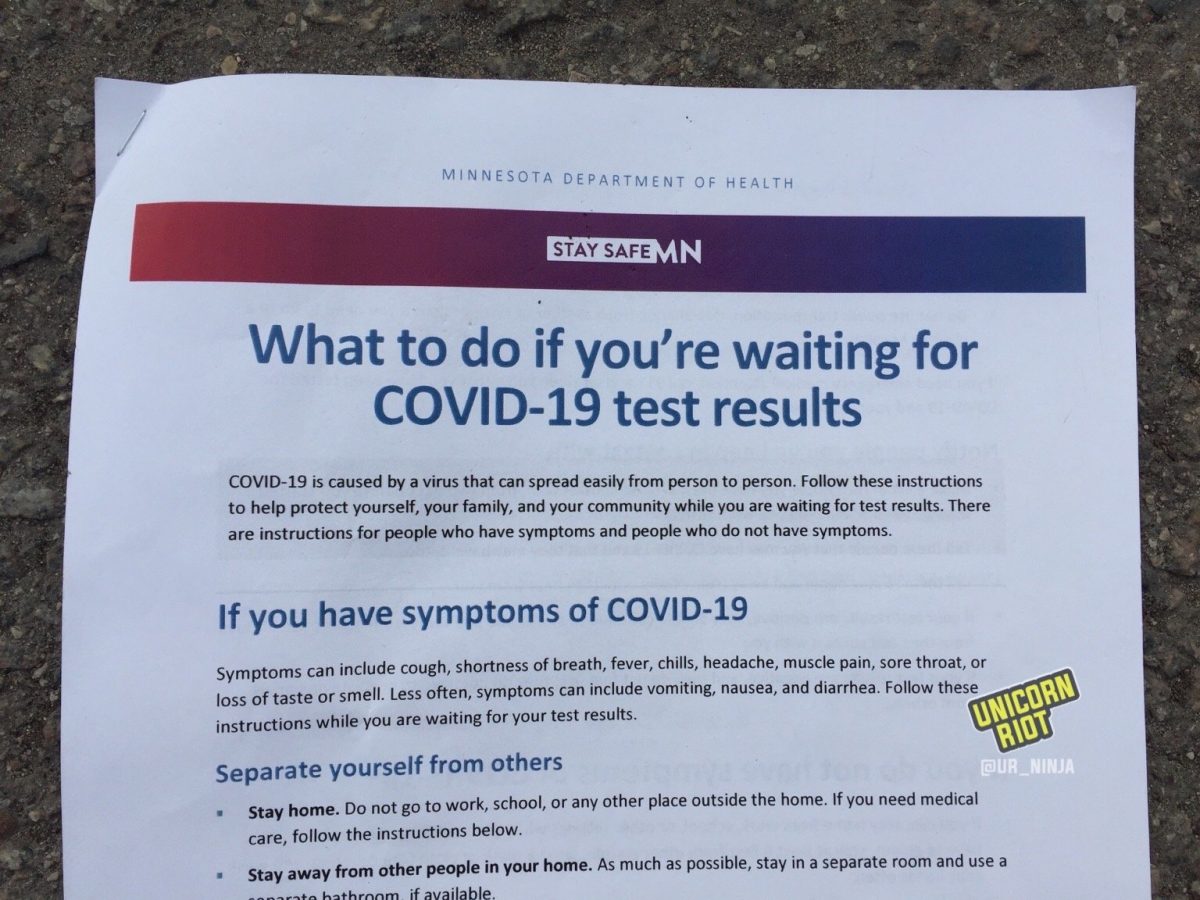
Specimen collection in the nose swab test takes place via careful insertion of a long cotton swab, which is used to gently gather a sample of the moist substances at the back of the nasal cavity. The same swab is used in first one nostril then the other, then is placed in a plastic vial to be sent away for testing.
The actual medical procedure was being performed by members of Minneapolis’ Native American Community Clinic as well as by employees of the City of Minneapolis’ Health Department. Everyone involved with the testing was wearing personal protective equipment (PPE).
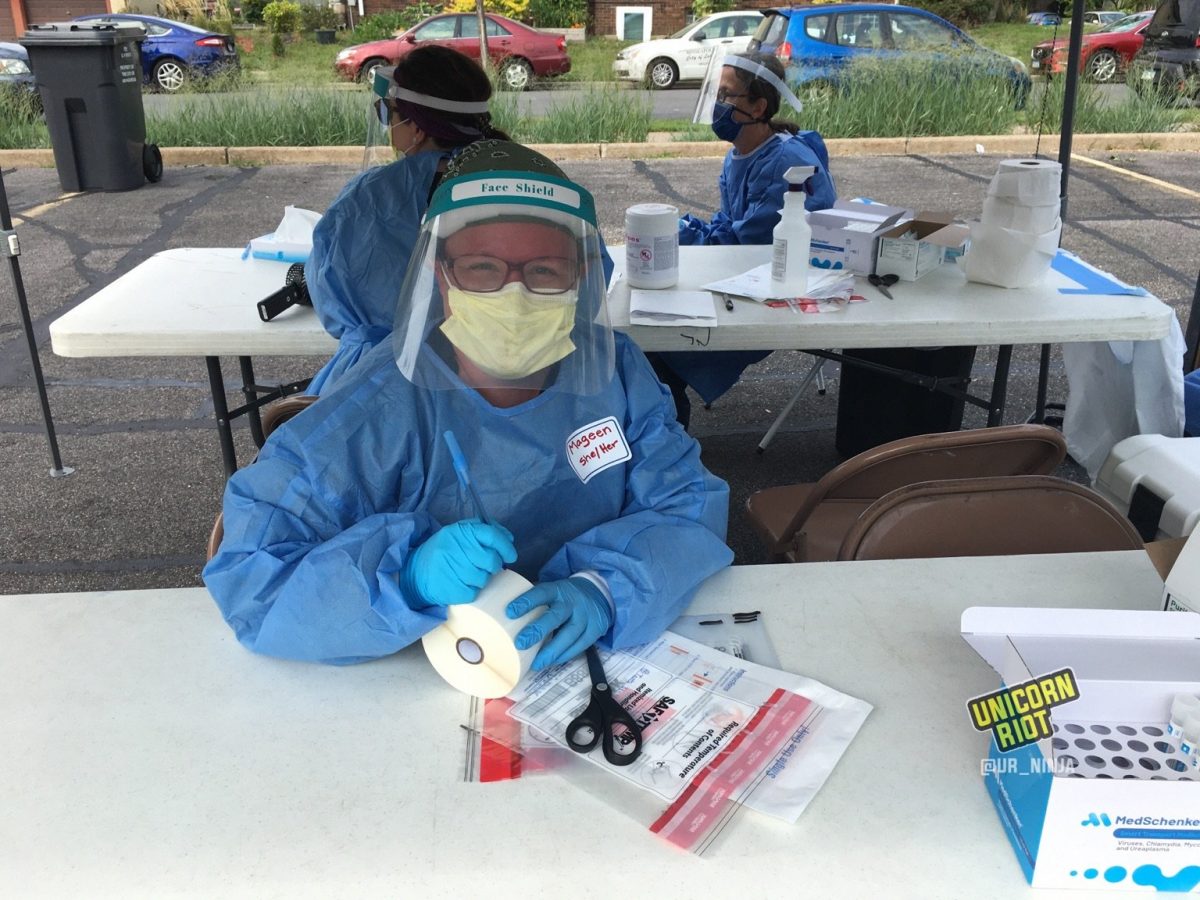
Minneapolis epidemiologist Mag Caines said she was happy to be able to assist in making the testing process more open and transparent, as well as help de-stigmatize positive test results and even the very act of getting tested.
Mag explained that the testing kits were being provided by the Minnesota Department of Health, and that the event had been made possible through the city’s cooperative partnerships with groups like the Native American Community Clinic and Family Tree Clinic.
She pointed out the ‘community doulas’ who were there “to help this space feel safe and non-traumatizing,” in a time of unrest and rampant disinformation about COVID–19. Mag added that the free testing was happening because it had been requested by the community.
Influenza vaccines were also being offered by Hennepin Health, separate from the coronavirus tests. While the flu shot itself was free, a person’s health insurance information was required in order to receive treatment.
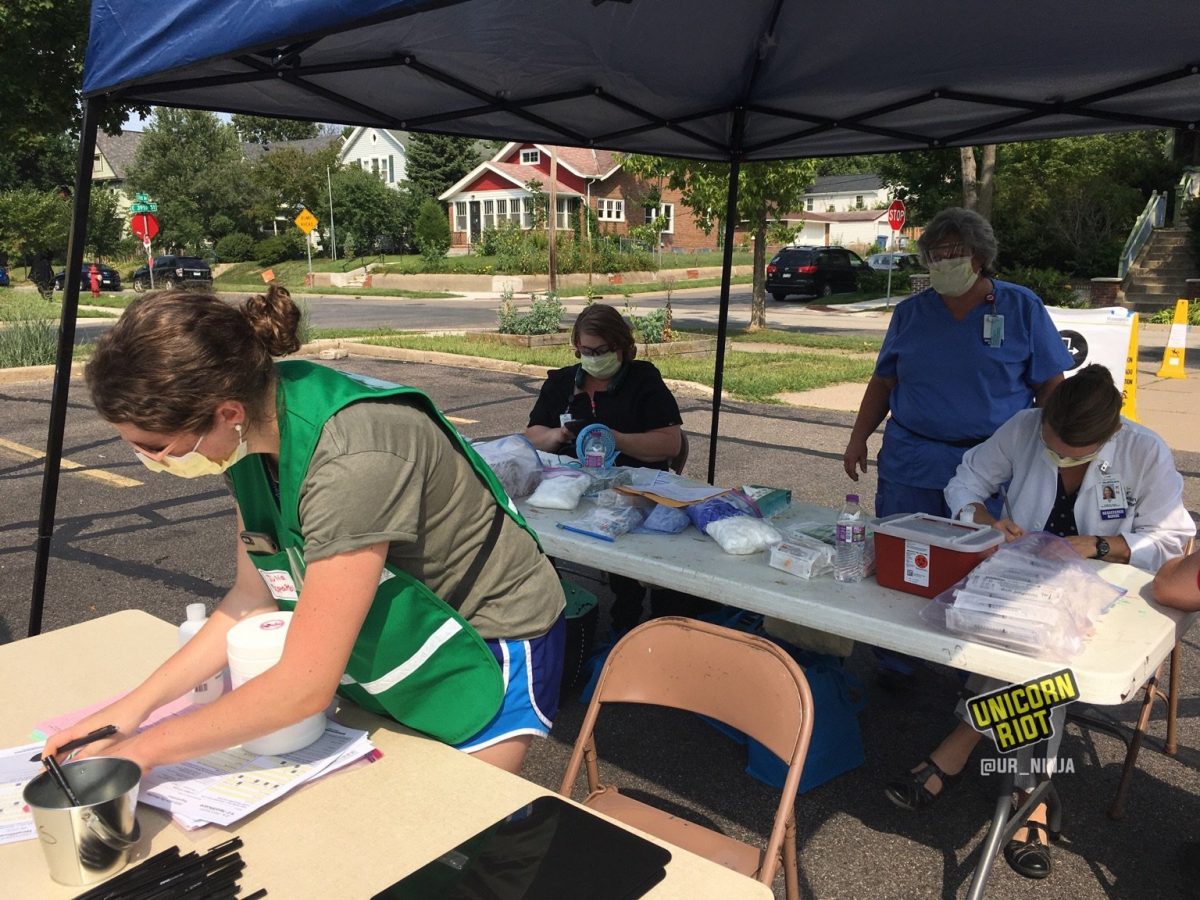
Community-Informed Testing
The community guides were spearheaded by the Black Liberation and Abolitionist Cohort (BLAC) a local group of Black abolitionists that crystallized during the George Floyd uprisings in Minneapolis.
According to Hadija Steen Mills, a representative of BLAC and of Family Tree Clinic, BLAC has been advocating since June for “additional testing that is stable, trauma-informed, and culturally-competent.“
While Twin Cities community members were responding to the murder of George Floyd with grief and rage, MDH issued a statement about the ongoing pandemic and recommended anyone involved in recent public events be tested for COVID–19.
Problems arose when the four free testing sites set up by the city were “not fully accessible to the communities intended for those services,” said Hadija.
“After over three months of advocacy, working toward a semi-permanent testing site, we were granted two afternoons of testing.“
—Hadija Steen Mills, Black Liberation and Abolitionist Cohort (BLAC)
Death statistics show unequivocally that COVID–19 has disproportionately impacted non-white communities. Hadija stated that the six days of testing provided by the city was insufficient to serve Minneapolis’ BIPOC (Black, Indigenous, and people of color) residents, and that the lack of truly accessible testing will widen pre-existing disparities between non-white and white communities.
“One of the problems is the bureaucratic hold on testing services,” they explained:
“The Cities, Counties, and State are individual organizations that are not creating a cohesive response to this Public Health crisis. MDH and Tim Walz’s office have said repeatedly they support BIPOC communities in this fight against health inequity, but are not providing adequate testing and resources, despite community efforts.“
— Hadija Steen Mills
BLAC’s objective for a free COVID–19 testing site has been to create a trauma-informed, culturally-inclusive experience “that acknowledges historical medical abuses that have hurt BIPOC and LGBTQ communities.” According to Hadija, BLAC has a relationship with the Black Visions Collective, both groups “working toward similar liberation, goals, and accountability.“
At the entrance to the site, ‘community doulas’ greeted people and guided those seeking testing through the initial steps of the process, answering questions and providing assurance to anybody who was dreading the medical procedure.
A doula is typically found supporting expectant mothers supplying answers to questions, alleviating anxiety, and providing other means of support to mothers aside from medically assisting in their delivery.
‘Comfort Care Kits’ were available for free to anyone who wanted one. They contained a cloth mask as well as an educational resource list about avoiding coronavirus infection and dealing with COVID–19.
The community guide positions were made possible by BLAC through a grant from the Groundswell Foundation. Presently Family Tree Clinic is acting as BLAC’s fiscal sponsor.
Resources provided by the MDH at the free testing site were geared towards non-homeless individuals and families; “Stay home” was listed as the first thing to do if a person is showing symptoms.
Healthcare Reparations
For unhoused people, a continuing challenge throughout the COVID–19 pandemic has been how to shelter in place when one has no long-term shelter.
Two weeks ago we heard from an unhoused Minneapolis resident who told us he would resist being moved from the sanctuary encampment as he had no place else to go.
In addition to the tangible benefit of a free long-term community-informed COVID–19 testing site, BLAC is also demanding the state be held accountable for perpetuating inequality between its residents, as well as acknowledge that racism is a public health crisis and immediately release state funding “to support BIPOC Minnesotans from further unjust abuses.“
Read BLAC’s five demands below:
1. We demand accountability on the behalf of Governor Walz’s office and the Minnesota Department of Health to provide equitable, stable, accessible, community-led COVID–19 testing sites.
2. We demand that Black, Indigenous, and People of Color will no longer be tokenized and continually used as a soundbyte. We deserve follow-through and will no longer be an empty promise.
3. We demand a system that coordinates the Cities, Counties, and State into a cohesive unit that works for the people it serves. We will no longer stand for systems that create structural merry-go-rounds that mask oppressive behavior.
4. We demand emerging disparities, specifically around the novel [coronavirus], be addressed immediately, and not wait until it is too late for under-resourced communities.
5. We demand that racism is acknowledged, by the state of Minnesota, as a public health crisis and state funding be immediately released to support BIPOC Minnesotans from further unjust abuses.
—demands provided by Hadija Steen Mills
As test kits have become more available, open-air testing centers offering free tests are becoming more commonplace.
Just four months ago, symptomatic individuals were being denied testing if they hadn’t recently traveled anywhere or didn’t know anyone who had themselves tested positive. Asymptomatic individuals are now permitted to be tested; if free testing became wide-spread, those who are carrying the virus yet showing no signs of it could be isolated, identified, and treated if necessary.
Though this particular free COVID–19 testing opportunity has ended, Hadija said the event organizers “hope to continue this work and have a testing site that can continue providing services,” noting that could involve a mobile test site.
Follow us on X (aka Twitter), Facebook, YouTube, Vimeo, Instagram, Mastodon, Threads, BlueSky and Patreon.
Please consider a tax-deductible donation to help sustain our horizontally-organized, non-profit media organization:

Unicorn Riot's COVID–19 Coverage:
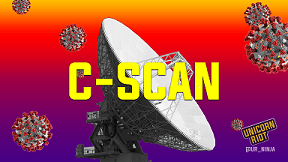
- “Brazil is Asking for Help” – Artists and Activists Speak Out - April 10, 2021
- Brazilian Pandemonium: COVID-19 Kills Over 300K - March 27, 2021
- COVID-19 Deaths in Minnesota Prisons Continue to Rise - February 17, 2021
- Brazil Nears 200K Deaths as Politicians Continue to Downplay COVID-19 - December 20, 2020
- Winter of Coronavirus: Seeking Shelter in Minneapolis During COVID–19 - December 14, 2020
- Denver Sweeps 300+ Tent Encampment Residents - November 30, 2020
- Unhoused Community Forms Tenants Union, Constituents Protest at Commissioner’s Home - November 11, 2020
- Minneapolis Prioritizing Park Sweeps Over Sheltering the Unhoused - October 29, 2020
- Court Protest Aims at Boston Covid Housing Crisis - October 29, 2020
- Philly Starbucks Worker Delivers NLRB Unfair Labor Practice Complaint - October 15, 2020
- Demands Reignite for Releases from GEO ICE Jail Amid New Covid Outbreak - October 5, 2020
- Peavey Park Sanctuary Homeless Camp Evicted in Minneapolis - September 24, 2020
- New Month Brings Added Urgency To Minneapolis’ Housing Needs - September 2, 2020
- COVID–19 Testing DeMystified at Community-Informed Coronavirus Testing Site - August 29, 2020
- Sanctuary Camp Residents Pressured to Move, No Housing Solution In Sight - August 22, 2020
- Coronavirus, Corruption, and Resistance: Life Under South Africa’s Lockdown - August 17, 2020
- Authorities Visit Loring Park Tent Encampment, Bring Eviction Scare - August 10, 2020
- Minneapolis Park Police Displace Sanctuary Encampment - July 22, 2020
- Homeless Philadelphians Moving Into Vacant City-Owned Homes - June 22, 2020
- Encampment to ‘Free Them All’ Outside GEO ICE Detention Center - May 26, 2020
- The Coronavirus Crisis in Brazil – An Interview with EmiciThug - May 22, 2020
- Nurses Picket Over Lack of Protection From Ongoing Viral Pandemic - May 21, 2020
- Mutual Aid to Detained Refugee Women Grows — Coronavirus in Greece Part 3 - May 7, 2020
- Minneapolis May Day Protest Supports Essential Workers - May 2, 2020
- MN Demonstrations, Demands to Free Prisoners Escalate - April 30, 2020
- Denver ‘Clean-ups’ Displace 100+ Unhoused Residents Amid Health Crisis - April 30, 2020
- Worker-Occupied Factory Sends Soap to Refugee Camp – Coronavirus in Greece, Part 2 - April 28, 2020
- A Country Quarantined, Coronavirus in Greece Part 1 - April 25, 2020
- Who’s Calling to ‘Liberate Minnesota’, and Why? - April 21, 2020
- Living with COVID–19 - April 17, 2020
- Philly Mayor and Judges Pressured To Release Inmates From Jail - April 15, 2020
- Calls for Rent and Mortgage Freeze Outside MN Legislature - April 14, 2020
- What Is Coronavirus and How Do Humans Defeat It? - April 10, 2020
- Car Protest Demands Philadelphia Officials Release Prisoners To Save Lives In Pandemic Crisis - April 10, 2020
- ‘Cancel Rent’ Demo Calls for a Rent and Mortgage Payment Freeze as COVID-19 Spreads - April 9, 2020
- Coronavirus in the Caribbean: COVID–19 Update from Puerto Rico - April 2, 2020
- ‘Never Again’ Demo Demands Release of Detainees Amidst COVID–19 Pandemic - March 30, 2020
- South Africa Under Lockdown as COVID–19 Spreads - March 29, 2020
- Providing Mutual Aid Amidst the Coronavirus Pandemic in Minnesota’s Twin Cities - March 27, 2020
- As U.S. Coronavirus Cases Top the World Charts, Minnesotans’ “Stay at Home” Order Goes Into Effect - March 27, 2020
- “Everyone Deserves A Cost-Of-Living Adjustment”: Interview with UCSC Striker Yulia Gilich - March 26, 2020
- ‘Real boog hours’: Neo-Nazi Terror and the Coronavirus Crisis - March 20, 2020
- Coronavirus Concerns End St. Paul Educators Strike, Close Many Public Schools - March 14, 2020
